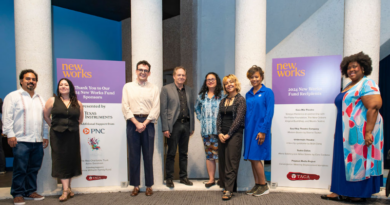Judge Lynn Holds Court at Luncheon
Leita Marsh, a charter member of the Altrusa club of Dallas in 1933, was a pharmacist at a time when women were excluded from that, and almost any, professional field. On Wednesday, her daughter the honorable Frances J. Maloney, now eighty-three and a retired associate justice for the Texas Court of Appeals, served as honorary chair of Altrusa’s Women’s Luncheon and silent auction.
The club history of Altrusa, an international non-profit organization, traces a line of women in Dallas who have fought to be included in the professional world, and to improve gender equality for future generations. This was in evidence Wednesday.
The Altrusans decorated the historical Old Red Museum red, white, and blue, with Lone Star flags waving from tables in salute to Texas’ birthday the previous day. But the main focus of the event was a celebration of National Women’s History Month.
A roomful of high-powered women, including several attorneys and judges, as well as DA Susan Hawk, gathered to hear keynote speaker the honorable Barbara M. G. Lynn address the role of women in government and public service.
Lynn began by quoting President Obama on Women’s History Month: “We remember the trailblazers of the past, including those who were not in the history books.” She went on to discuss her experience joining the first class of female students at UVA in 1970 and how she and her classmates had to fight for inclusion in clubs.
After completing her law degree at SMU, she was refused employment by law firms in Dallas who were open about their discrimination. “We like you. If we were hiring women, we would hire you,” she was told.
Undeterred, she secured a position at Carrington Coleman and is now a chief judge of the northern district of Texas. She cited two of her great influences: Sarah Hughes, who was a judge and had to preside over trials at a time when women were not even allowed on the jury; and Supreme Court Justice Ruth Bader Ginsburg.
Citing statistics about women in law and judicial positions, she mentioned that women, in light of the recent vacancy following Justice Antonin Scalia’s death, hold 37.3% of Supreme Court positions. “In light of the vacancy, perhaps still counting.”
Her speech was an affirmation of the progress women have made and the power of women to effect real change in the professional world. But she said we still have a long way to go, and that this should be a constant effort, not just during March.
And what’s next for her? Speaking about the controversy surrounding the replacement of Justice Scalia on the Supreme Court, she said, “I’ll be waiting by the phone.”








